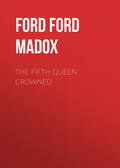
Форд Мэдокс Форд
The Queen Who Flew
"Come, this will never do!" the Queen said to herself. "Whatever will they think of me?" So she arose from between the warm, clean sheets, and, having dressed herself, went downstairs. There she found the little old woman busy in the kitchen.
"Good morning, my dear," she said.
And the Queen answered, "Good morning, mother."
And the little old woman's eyes smiled her pleasure. "I didn't wish to wake you," she said, "you seemed so tired last night. My son has gone off to his ploughing; but you will see him as you pass the hill, and he will guide you a little on your way, if you have to go further." The little old woman's eyes looked quite wistful. "We wish you would stay a little while with us; we should like it so much."
"Why, of course I will," the Queen said; "that is, if I can be of any use to you."
"Oh yes, you can be of use," the little old woman said. "But it is such a pleasure for us to have guests, for we like to talk with them, and we like to please them as much as may be. But here is your breakfast; you must be quite hungry. And afterwards – after to-day, that is – my son will show you all about the farm. Only to-day he wants to finish his ploughing, and I am too old to go very far up the hills."
"It is wonderful how your son manages to work as he does," the Queen said.
And the little old woman's eyes looked proud and happy.
"He has lived all his life here, you see When he was quite a baby a flash of lightning blinded him; but now he knows his way everywhere about, and he can do almost all the farm-work. Sometimes he has a boy to help him; but just now, they're harvesting at our neighbour's, and the boy has gone down to help. But it makes my son rather slow in his ploughing, for he has to guide himself by feeling with his feet the last furrow he has made."
"Oh, I could lead the horses for him," the Queen said.
And the mother answered, "Yes, do, my dear; and you can take your dinner out with you. His dog always fetches his for him."
So the Queen finished her breakfast, and then set out along the valley towards the ploughing place.
By daylight she could see better how pleasant a place the valley was, very green in the bottom, with here and there a pollard willow by the stream, and here and there linen laid out to bleach on the grass. But the steep hills that shut it in were purple with heather, and brown with bracken, and, now and then, a lonely thorn tree. Behind her was the little white cottage, with a cluster of trees drawn down around it, and with the ducks and turkeys and chickens crowding the valley in front of it. Indeed, every now and then along the valley a lily-white duck would pop its golden-billed head out of the reeds and meadow-sweet of the stream to look at her as she passed along.
So she came to the hill where the valley made a sharp turn, and on the top of which she could see the ploughman. Up it she climbed through the heather, and speedily reached him.
"I've come to lead the horses for you," she said.
And he looked towards her and smiled.
"That's right," he said. "Then you're not going away just yet. It's better here than being shut up in a palace garden, with no one but a bat to talk to."
"It is," the Queen said simply.
So, through the autumn day, she led the horses up and down the furrows, whilst be drove the share deep into the ground.
And through the blue sky, up the wind and down the wind, came the crows and starlings to feed on the worms that the plough turned up. So, late in the afternoon, they had come as far as he meant to go.
"Further down the hill," he said, "the wheat would catch the north wind. So that's enough for to-day, Queen Eldrida."
"Don't call me Queen Eldrida, because, if I am a queen, I'm not your queen. Just call me Eldrida."
"One name's as good as another," he said, as he slipped on his coat. "Now let's go home, and I'll show you a little of the valley behind the house."
So the Queen stayed for a while with them, and did as they did. And the blind man led her up the hills, and on the hilltops called the sheep, and from all sides they came to his call.
And the Queen halved his work for him, and did those things which his want of sight prevented his doing.
Sometimes she stayed to help the little mother indoors, but, on the whole, she preferred being out in the open air with the blind man.
Then came the beginning of winter, and she went with him up the hillsides, and in among the storms to fold the sheep, and drive the cattle home to the byres.
And then midwinter, when, in the morning, they had to set to work by lanthorn light that cast a luminous yellow circle round them upon the snow, and made their great shadows dance strangely.
Then the snows swept down into the valley and covered everything up beneath the soft white waves, so that, when they wanted to go out, they had to get through one of the roof-windows, for the door was all covered up. Then indeed it was very cold work getting about, and the Queen had always to guide the blind man, because the had covered all his familiar landmarks. The made it very hard walking, too, and put the Queen quite out of breath, but he sang quite lustily a song —
"'Cold hands, warm heart,'
Then let the wind blow cold
On our clasped hands who fare across the wold.
"'Hard lot, hot love,'
Then let out pathway go
Through lone, grey lands; knee-deep amid the snow."
But the Queen was generally too out of breath to be able to sing at all.
At last, however, the snow came right over the roof-tree, and they could not go out of the house at all. So they sat quietly around a great fire, and the little old woman span, and the Queen worked at the loom, and the blind man wove baskets out of osiers. And they told tales.
Said the little old woman, "I will tell you a tale that I had from my grandmother, and she had it from hers, and so on, a great way back.
"Once upon a time, upon the earth there were no people at all, no men and women, but only little goblin things that covered the whole earth and made it a beautiful green colour. But the sun was a bright flame colour, and the moon very, very white. So the Sun and the Earth took to quarrelling as to which was the more beautiful of the two.
"Said the Earth, 'I am the more beautiful; such a lovely green as mine was surely never seen.'
"Said the Sun, 'But just look at my mantle of flame.'
"So, as they could not possibly agree, they submitted the matter to the Moon. Now, the Moon was horribly jealous of the Sun, because he so terribly outshone her; so she gave her verdict for the Earth.
"Then, indeed, the Earth was proud, and gave itself such airs and graces that not only the Sun, but the Moon and all the Sun declared war against it.
"So early one rooming the Sun peeped up over the edge of the sea, and sent a great trail of golden warriors over it to attack the Earth-spirits.
"They, for their part, were armed and ready, and all day long they fought and fought, and at last the Sun's warriors had to depart in a long trail over the sea to the Sun again. Then the Earth was more triumphant than ever. But, just as they were lying down to rest, slowly, slowly, the Moon came up and sent a great trail of its warriors over the sea, and the Stars poured down showers of little, little warriors, and the poor Earth-spirits had to begin and fight all through the night. And, although they killed hundreds and hundreds and beat the rest off, no sooner was it done than they had to begin all over again against the Sun.
"This went on – day in, day out; night in, night out – for a long, long time, until the poor Earth-spirits grew wearier and wearier, and their lovely green colour changed into a sickly yellow hue.
"Then in despair they prayed to the spirits of the air and of the great waters to assist them. And the waters arose and covered in the Earth, and the winds of the air brought a mantle of clouds, so that the Earth was shielded from the fury of the Sun and the constellations; but, alas! when the waters receded and the skies grew clear again, it was found that all the poor Earth-spirits were drowned – all save a very few who had taken refuge on the tops of the mountains.
"So these few, having such a lot to eat, gradually grew and grew till they became men. And the dead bodies of the green Earth-spirits grew out of the Earth, too, and became the fruits of the Earth; but the dead bodies of the Sun and Moon warriors became gold and silver, and men dig them out of the Earth.
"But still the quarrel goes on; for gold and silver are man's greatest curse, and the fruits of the Earth his one blessing."
And so with tales and work they beguiled the time of the waiting for the snow's melting, and at last it came. The valley was filled with the roaring of the brook, grown large with the melting of the snows, and the robin sang from the copses.
So the spring came on, and the earth grew green, and it was the time of sowing, and the Queen had almost forgotten that she was able to fly – indeed, she mostly left her wind-flower crown at home.
But one day her eye fell upon it, and the thought suddenly struck her that the bat had said that the wind-flowers had the power of curing blindness.
"Now, if only I knew how it was to be done, or if I had a few more of them I'd cure him. Now, it's not really so very far from here to there. I might just fly over to the palace garden and ask the bat, and be back this very evening" – for it was then the early morning. "And I won't tell them anything about it, and it'll be delightful."
And so, without any more hesitation, she just opened the little window and was up among the dawn-clouds that were sweeping up from over the sea. It was a little chilly and very lonely up there, and the silent flights of seagulls that she caught up and overpassed seemed too alarmed to talk to her. The Queen felt a little lost, as if there were something missing.
"Somehow it doesn't seem half as nice as it used to do," she said to herself. "I wonder why it is? I don't think, after I get home – I mean back here – I shall ever go flying again."
But she folded her hands in her cloak and went silently on over the grey shimmering sea. The sun grew higher and higher, and it was about eight in the morning before she was hovering over the city.
She alighted in a street that seemed somewhat empty, because she disliked the attention that her mode of progression usually excited.
Just in front of her, under a shed formed by the pushing up of the shutters of his shop, a tailor was seated, cross-legged, working away with his head bent down over his work.
"Good morning!" the Queen said. "Can I be of any use to you?"
The tailor peered up at her through a great pair of horn spectacles.
"Eh?" he said.
"I said, 'Can I be of any use to you?'" the Queen replied.
And the tailor regarded her in a dazed way. Suddenly he said —
"Oh yes; marry me, marry me, only marry me!"
The Queen said, "Oh, nonsense," because she had just remembered the elixir.
But the tailor answered, "It isn't nonsense – it really isn't. It's true I'm married already; but I'll knock my wife on the head, and then I'll be free."
But before the Queen could answer anything at all there began a sudden growling sound that resolved itself into a succession of footsteps coming rapidly down wooden steps, and, in a moment, a door burst open just behind the tailor's back. There was an old woman with a great broom just behind it.
"Ah, would ye now! murder your wife, a respectable married woman, for the sake of a hussy that comes dropping down out of the chimney-tops. I'll teach you."
And with one sweep of her broom she knocked the poor little tailor off his board, and made a dash at the Queen.
But the Queen took to her heels and ran off.
"Why, she's worse than Mrs. Hexer," she said to herself. "But really this elixir is a great nuisance. It makes it impossible to have any peace. But I wonder what all the flags and decorations are about."
Just at that moment two people, who appeared to be a servant-girl and her mother, came out of a neighbouring house. They were very gay in holiday costume.
"What is to happen to-day?" the Queen asked.
And the mother answered, "Why, don't you know? The Queen is twenty-one to-day, and she's going to marry the Regent, Lord Blackjowl."
"Going to marry the Regent!" the Queen said. "Why, who told you so?"
"Everybody knows it," the mother answered.
"But how did everybody get to know it?" the Queen asked.
And the mother answered, "The Regent told them, I suppose."
And the girl said, "It's up among the Royal proclamations on the notice-board at the palace."
The Queen said, "Oh! Will you show me the way to the palace?" she continued.
"Why, certainly," the girl said. "We were just going that way to see the procession."
So they set off through the gay streets. As they went along the Queen could see the young men on every side falling in love with her; but she paid no attention to them.
"Are you glad the Queen's going to be married?" she asked her guides.
And the girl answered, "Oh yes; we get a holiday to go and see the procession."
"Why, then, I suppose you'd be just as glad if the Queen died, and you could go and see her funeral?"
And the old woman said, "Of course!"
By that time they had come to the market-place. It was crowded with those who had come to see the sights, and the fountains were running wine instead of water; so, of course, there was rather a scramble to get at the fountains. That left the ground clear for the Queen to get to the notice-board where the Royal Proclamation hung.
There she saw, sure enough, the Regent's proclamation, saying that the Queen would marry him that day. At the end of it there was the signature, "Eldrida, Queen."
"Why, it isn't my signature at all," the Queen said.
And the mother and daughter looked at her askance.
"Have any of you ever seen the Queen?" she asked.
And the mother answered, "No; no one has ever seen the Queen but the Regent; but there was a story that a beggar told about a year ago, that she had flown out of the palace and away. And they did say that Grubb the honey-cake maker and some soldiers knew something about it. But the Regent had them all executed, so we never came to know the rights of the story. Anyhow, we're had to pay taxes just the same."
Now the Queen grew really angry with the Regent Blackjowl.
But she said, "Thank you," and "Good-bye," to the mother and daughter, and slipped away through the crowd to the side-wall of the palace, where, in the road, she had first commenced her travels.
Here there were very few people about, because there was little chance of seeing the procession from there. She waited until the street was almost empty, and then flew quietly over the palace wall and down into the familiar garden.
There it was, a little more neglected and a little more weed overgrown than ever, but otherwise just the same. Only it seemed to have grown a great deal smaller in the Queen's eyes; but that was because she had grown accustomed to great prospects and wide expanses of country.
The long, thorny arms of the roses had grown so much, that it was quite difficult to get under them into the little seat.
"Now I shall have ever so much trouble to wake him, and he'll be fearfully surly," the Queen said to herself.
But it is always the unexpected that happens – as you will one day learn – and the Queen found that the rustling that the leaves made at her entrance had awakened the bat.
"Hullo!" he said, "you there! Glad to see you. Heard from a nightingale that you'd been seen in disreputable company, going about with geese. Well, and what did you think of the world?"
"Oh, it's a very nice place when you're used to it."
"That's what you think," the bat said. "Wait till you come to be my age. But now, tell me your adventures."
"I'd better humour him," the Queen said to herself, and so she plunged into the recital.
When she had finished the bat said, "H'm! and so you're going to marry the Regent?"
"I'm not going to do anything of the sort," the Queen said.
And the bat asked, "Who are you going to marry, then?"
The Queen answered, "No one; at least – "
And the bat said, "Just so."
And the Queen replied, "Don't be stupid. Oh, and tell me how one can cure blindness with wind-flowers."
The bat said, "Do you know how to make tea?"
"Of course I do," the Queen answered
"Well, you make an infusion of dried wind-flowers just like tea, and then you give it to the young scamp to drink."
"He's not a scamp," the Queen said; "but you're a dear good old bat all the same."
The bat said, "H'm!"
The Queen rose to her feet. "Well, I must be off," she said. "I've got a lot to do."
The bat said, "Wait a minute; I'm coming too;" and he dropped down and hung on to the Queen's shoulder. He was rather a weight, but the Queen suffered it.
"Why, there aren't any wind-flowers left!" the Queen said, surveying the spot where they had grown.
The bat said, "No; the weeds have choked them all."
The Queen rubbed her chin and said nothing.
And the bat merely ejaculated, "H'm!"
So the Queen entered the palace.
All the great halls were silent, and empty of people, and she passed through one after the other, shivering a little at their vastness.
At last she came before the curtain that separated her from the Throne Hall. It was large enough to contain the whole nation.
She pushed the curtain aside and found herself standing behind the great throne. Through the interstices of the carved back she could see everything that was going on. The Great Hall was thronged full of people from end to end. On the throne platform the Regent was waiting, evidently about to begin a speech.
The Queen stopped and peeped; there was a great flourish of trumpets that echoed and echoed along the hall, and the Regent began.
"Ladies noble, my lords, dames commoner, and gentlemen!" His great voice sounded clearly through the silence. "As you are well aware, our gracious and high mighty sovereign, the Queen Eldrida, has deigned to favour my unworthy self with the priceless honour of her hand, and that on this auspicious day. Her hand and seal affixed to the weighty document you have seen in the market-place."
The Queen walked round the opposite side of the throne into the view of the people, who set up a tumultuous cheer. The Regent, however, thought they were cheering him, and went on with his speech.
"I had also announced that it was her Majesty's royal pleasure to reveal herself to her loyal people's eyes on this day."
The Queen slowly ascended the steps of the throne and seated herself thereon. The great gold crown – it was six feet high, and so heavy that no head could bear its weight – hung above her head by a great gold chain.
The people cheered again, and still the Regent, whose back was to the throne, deemed that they were applauding his speech. He ran his fingers through his black beard and continued —
"It is, however, my painful duty to apprise you that her Majesty has been pleased to alter her design. We shall, therefore, be married in private in the Queen's apartments. The Queen's maiden modesty will not allow her to reveal her charms to the vulgar multitude."
He paused and watched the effect of his speech, nervously fingering his beard and blinking with his little eyes. The people whispered among themselves, evidently unable to understand what it meant.
Suddenly the Queen's voice rang through the hall.
"My people," she said, "it is an infamous lie! I am here."
The Regent started and turned round; his face grew as pale as death. But from the people a great shout went up at the discomfiture of the hated Regent. It echoed and reverberated through the great hall, and then silence fell again.
The Regent fell on his knees. "Oh, your Majesty," he said, "marry me! marry me! marry me! I adore you! oh, only marry me!"
But the Queen was very pale and stern. "This man," she said to the people, "has concealed my absence, has forged my name, has slandered me. I unmake him; I degrade him; and I banish him the land!"
Once again the people cheered to see the Regent led off by the guards.







